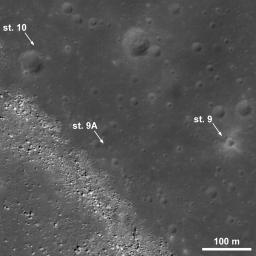
|
Retracing the Steps of Apollo 15
- Click the image above for a larger view
- Full-Res JPEG (1000 x 1000) (99.0 kB)
- Full-Res TIFF (1000 x 1000) (1.0 MB)
Caption:
The third and final EVA of Apollo 15 brought the astronauts to the edge of Hadley Rille (lower left). Disturbed regolith is observed along the crater rim at station 9 and at the edge of the rille at station 9A. Rover tracks are visible between stations 9A and 10. Image width is 520 m, 0.52 m/pixel, LROC NAC M11171816R.
Background Info:
NASA's Goddard Space Flight Center built and manages the mission for the Exploration Systems Mission Directorate at NASA Headquarters in Washington. The Lunar Reconnaissance Orbiter Camera was designed to acquire data for landing site certification and to conduct polar illumination studies and global mapping. Operated by Arizona State University, LROC consists of a pair of narrow-angle cameras (NAC) and a single wide-angle camera (WAC). The mission is expected to return over 70 terabytes of image data.
Cataloging Keywords:
| Name | Value | Additional Values |
|---|---|---|
| Target | Moon | |
| System | Earth | |
| Target Type | Satellite | |
| Mission | Lunar Reconnaissance Orbiter (LRO) | |
| Instrument Host | Lunar Reconnaissance Orbiter | |
| Host Type | Orbiter | |
| Instrument | Lunar Reconnaissance Orbiter Camera (NAC) | |
| Detector | Narrow Angle Camera (NAC), Wide Angle Camera (WAC) | |
| Extra Keywords | Crater, Grayscale | |
| Acquisition Date | ||
| Release Date | 2010-04-16 | |
| Date in Caption | ||
| Image Credit | NASA/GSFC/Arizona State University | |
| Source | photojournal.jpl.nasa.gov/catalog/PIA13058 | |
| Identifier | PIA13058 | |
